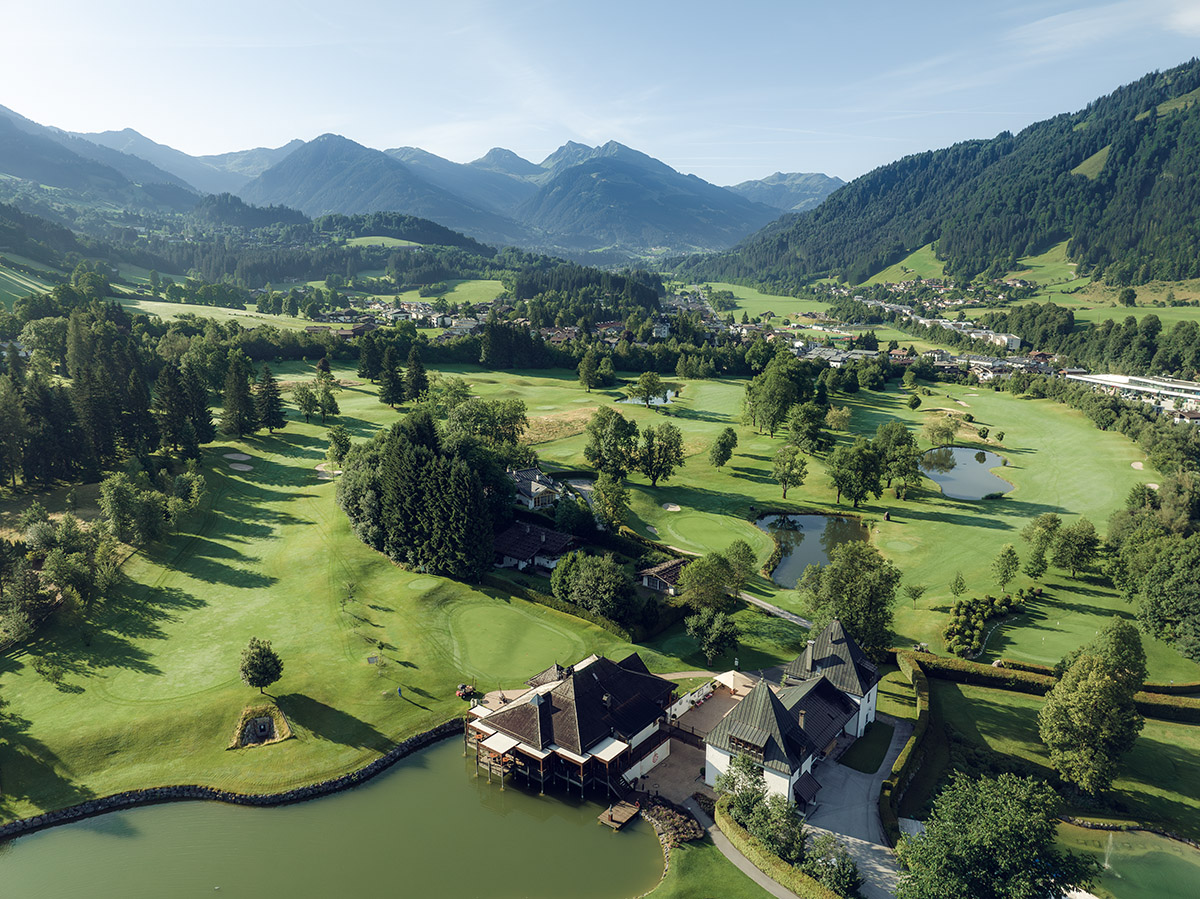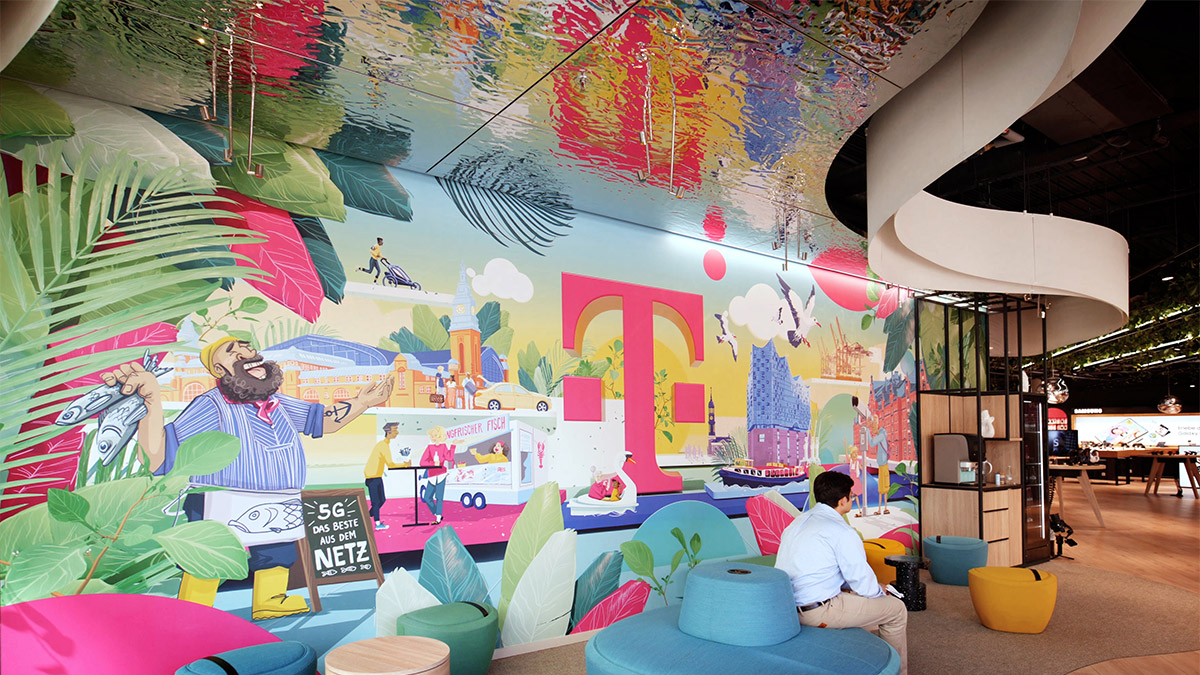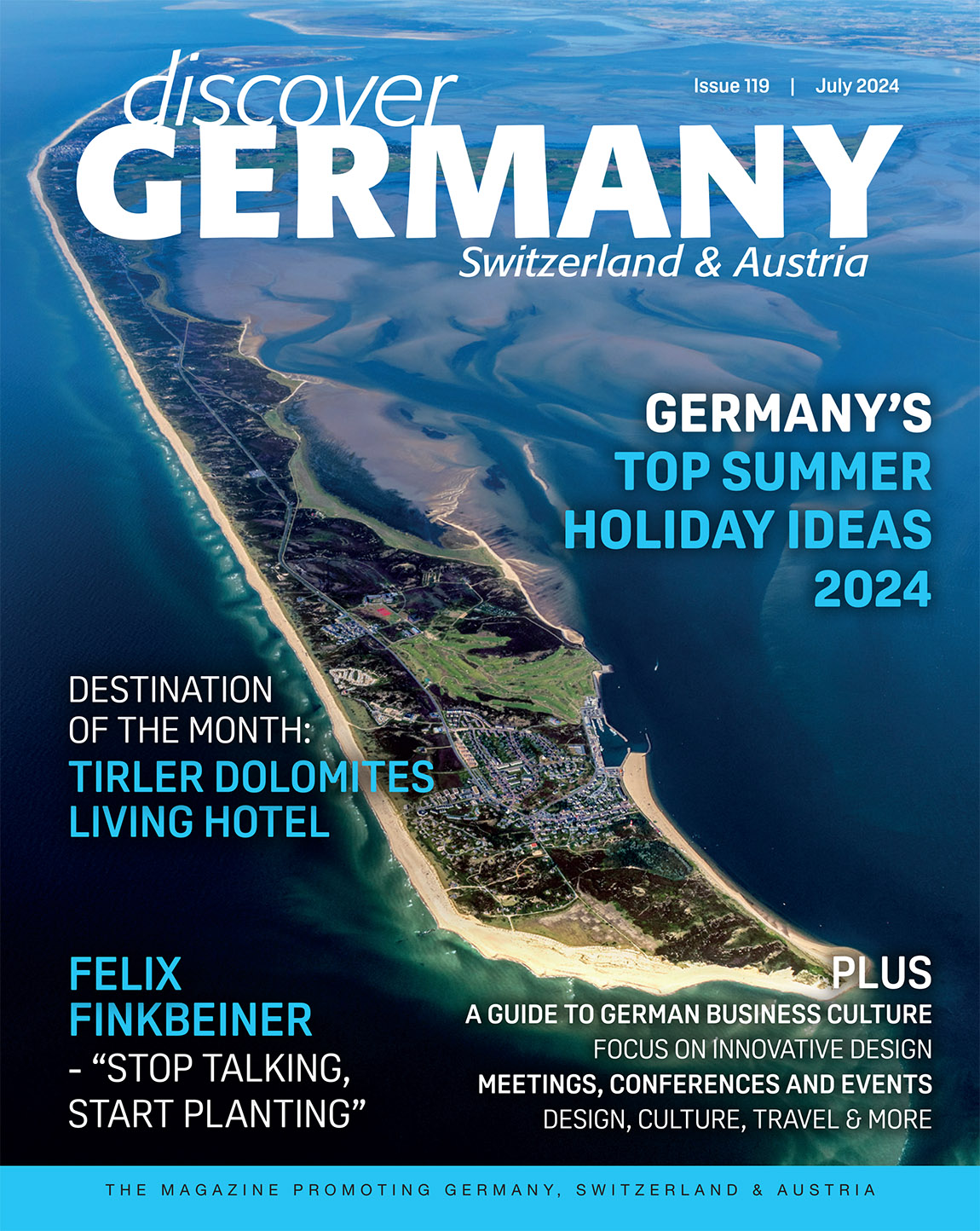Elbphilharmonie Hamburg – Spectacular architecture for a boundless music experience
TEXT: NANE STEINHOFF, HAMBURG MARKETING GMBH
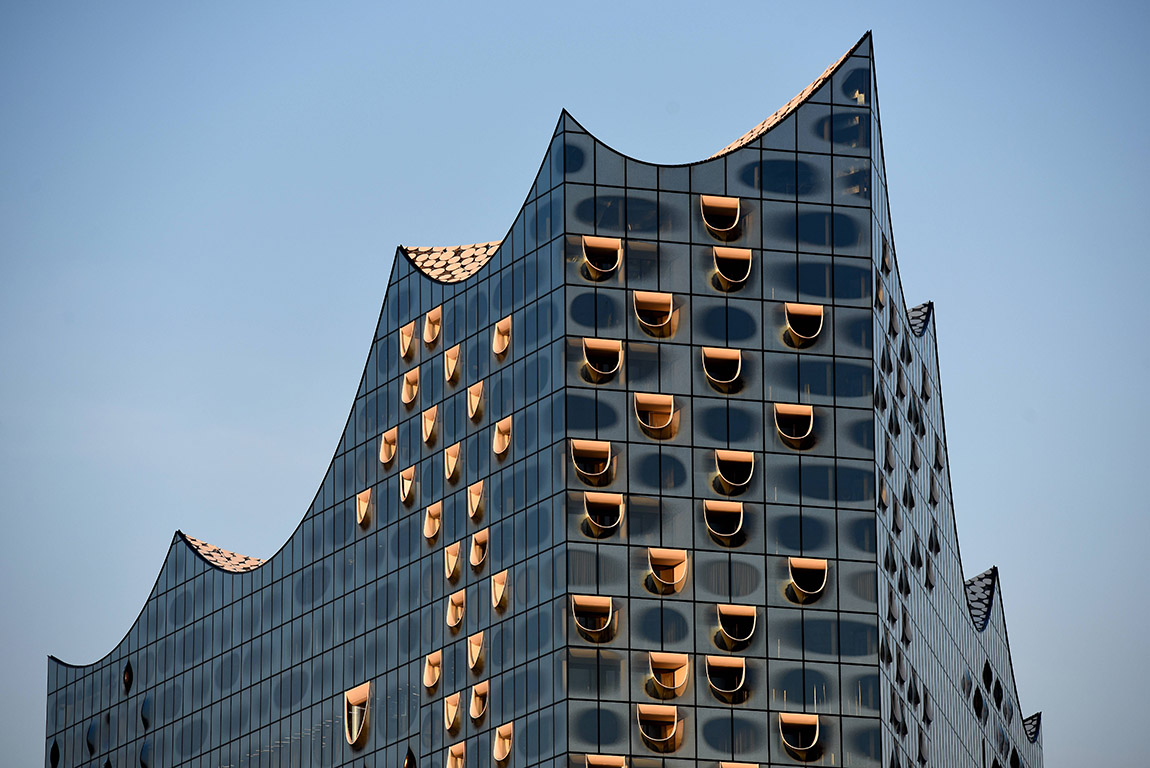
Elbphilharmonie in Hamburg. Photo: Mediaserver Hamburg / Michael Zapf
In the flow of the Elbe and surrounded on three sides by water, the Elbphilharmonie Hamburg is a centre of attraction for all who live in Hamburg as well as for visitors from all over the world. The spectacular landmark houses two concert halls, a large music education area, a range of places to eat and drink, a hotel and a public Plaza, which offers visitors an unparalleled panoramic view over the whole city.
The Elbphilharmonie was designed by the renowned Swiss firm of architects Herzog & de Meuron. Perched on top of a brick warehouse foundation – the former Kaispeicher A, which was built at the port between 1963 and 1966 and then used for storing tea, tobacco and cocoa – the glass structure with its wave-like top rises 110 metres high into the sky. Constructed at the western point of the modern HafenCity, Europe’s largest inner-city urban development project, in direct proximity to the Speicherstadt warehouse district – a UNESCO World Heritage site, the Elbphilharmonie serves as a symbol of the city’s past, present and future. It stands for Hamburg’s self-image of building on tradition to create something new, as well as for the many contrasts that coincide within the city and make up Hamburg’s character.
A city under the spell of music
Hamburg’s great appeal as a music city dates back to the 17th century: it was in 1678 that Europe’s first public opera house opened its gates here on the Gänsemarkt. Today, Hamburg’s rich music scene includes three professional orchestras, several distinguished soloists and chamber ensembles, jazz, rock and pop artists, composers, singer-songwriters, electro artists as well as several renowned training institutions. As a landmark for the city of music the Elbphilharmonie Hamburg provides a venue for many of these artists – and for some of them even a home: NDR Elbphilharmonie Orchestra is the Grand Hall’s orchestra in residence, and the Ensemble Resonanz is the Recital Hall’s ensemble in residence.
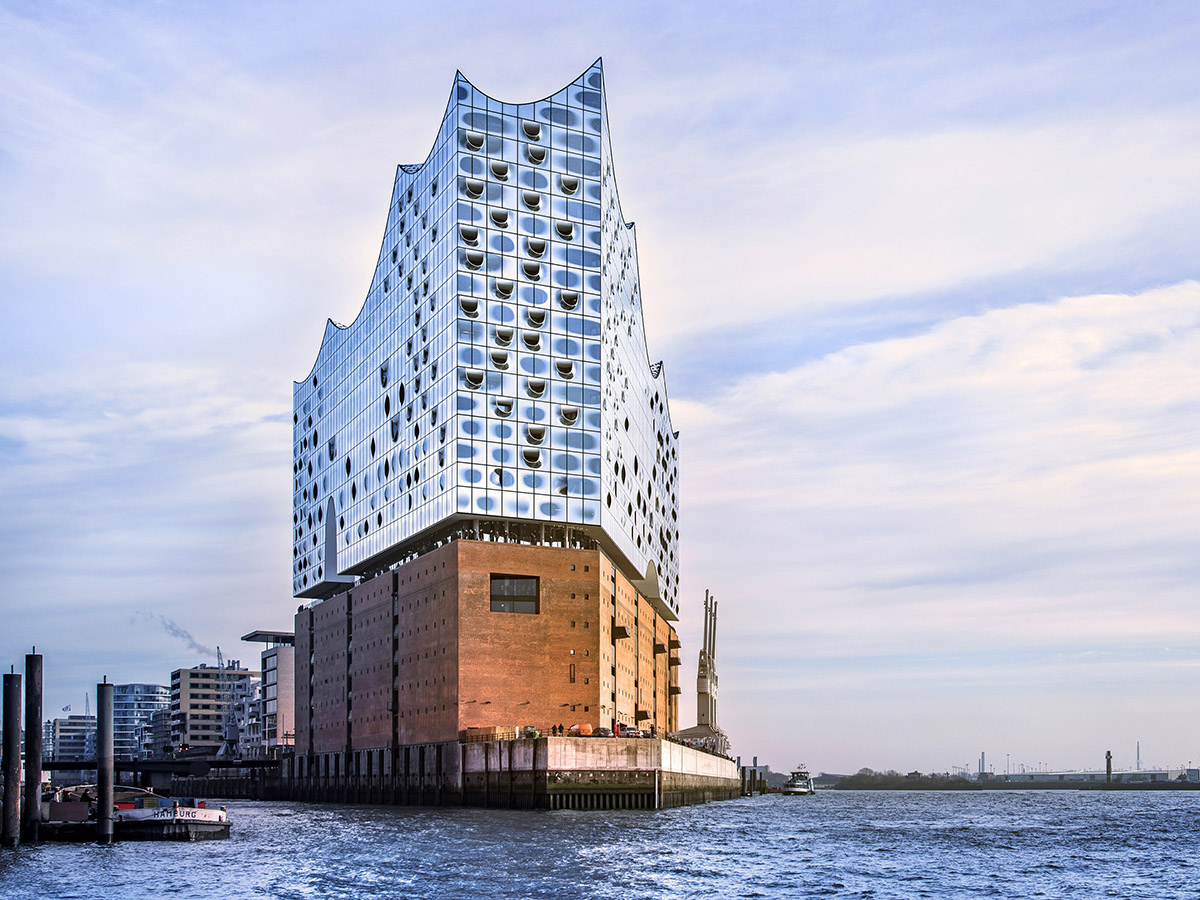
Photo: © Mediaserver Hamburg / Thies Rätzke
The people of Hamburg not only love their city, but they also love their music. And since Hamburg was never ruled by kings or princes, it has always been the citizens themselves who have shaped the city’s music landscape. Public music venues beyond those established by the church started evolving as early as the 18th century. 1908 saw the opening of one of Europe’s most beautiful concert halls: the Laeiszhalle, which was built in neo-Baroque style. And up until WW2, the Laeiszhalle was by no means the only venue for symphonic concerts: the Conventgarten, which was destroyed in 1943, accommodated an even bigger audience than the Laeiszhalle. The Elbphilharmonie Hamburg, an architectural gem and the city’s landmark not only in the realms of music, doubled Hamburg’s capacities and provides Hamburg with the great opportunity to (re)gain a prime position among the world’s most eminent music locations.
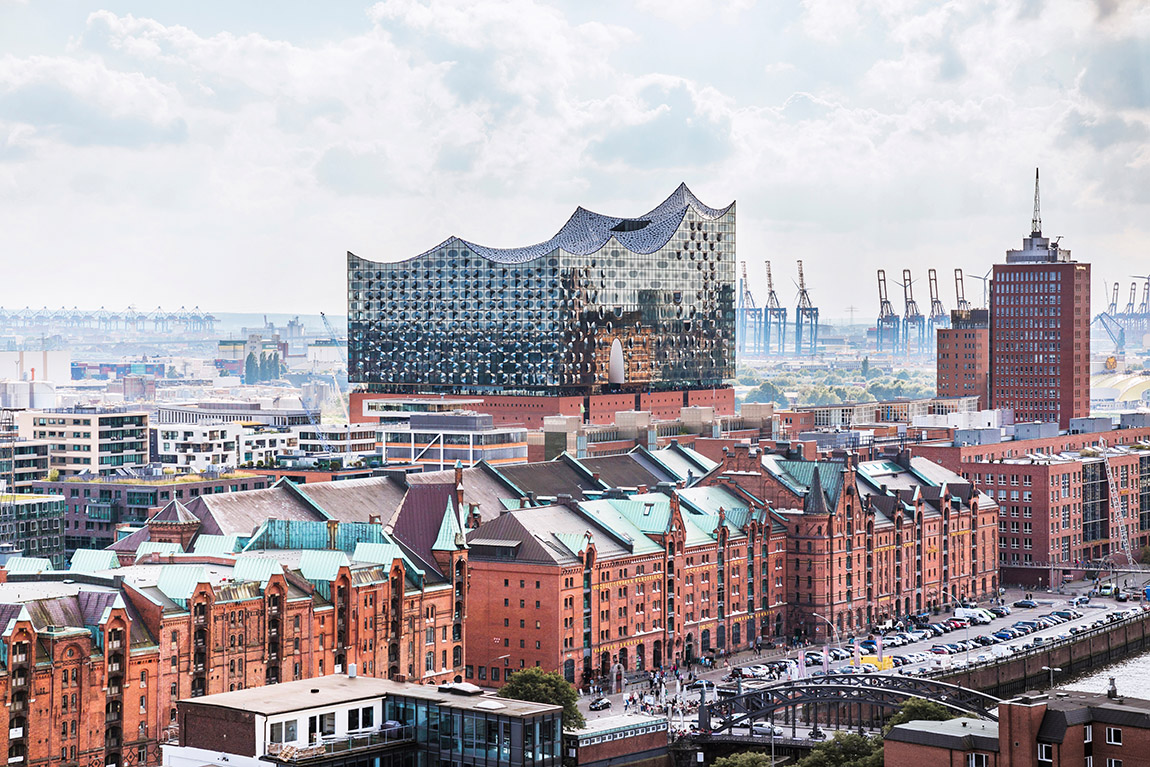
Photo: © Mediaserver Hamburg / Michael Zapf
There is a long tradition of classical music in Hamburg. The Oper am Gänsemarkt was opened in 1678 – as the first civic theatre in Germany. With the Composers’ Quarter near the famous major church of St Michael – known locally as ‘Michel’ – committed citizens and associations have created a place to honour composers who were born or worked here – including C. P. E. Bach, Johannes Brahms, Gustav Mahler and the baroque composer Georg Philipp Telemann, whose work was responsible for influencing and shaping the musical world at the beginning of the 18th century.
Anyone thinking of Hamburg as a city of music will not only be thinking of classical music, however. The Beatles, for instance, began their career right here in the city: from August 1960 until December 1962, the moptops played in different clubs around the Reeperbahn, and in doing so established Hamburg’s legendary live music scene. Young newcomer bands from all over the world still appear in the same clubs today, especially during the annual Reeperbahn Festival. Europe’s largest club festival offers stages for the stars of tomorrow at over 70 venues.
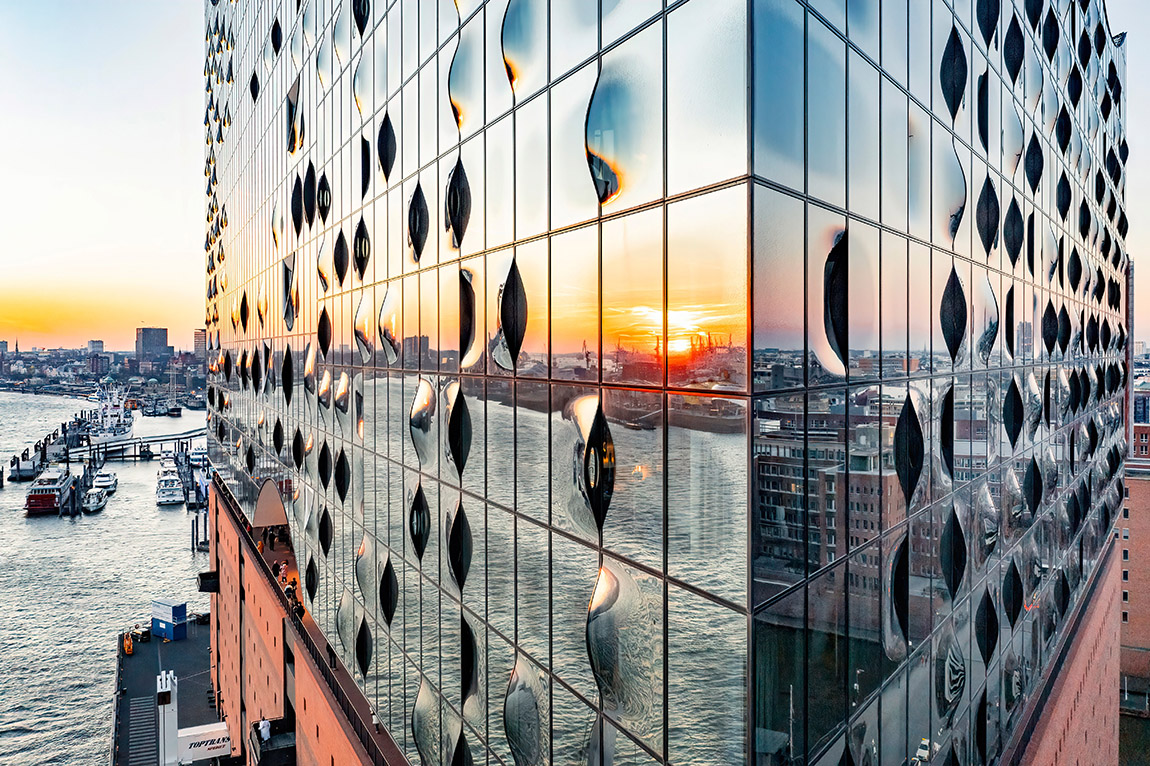
Photo: © Thies Rätzke
Music at the Elbphilharmonie
The Elbphilharmonie was primarily built as a concert venue for unamplified music. It is therefore logical that its two halls – the Grand Hall seating approximately 2,100 and the Recital Hall for an audience of up to 550, both of which are completely detached from the rest of the building in acoustic terms – mainly host orchestral concerts, chamber music and solo performances. These types of music do not need any kind of sound equipment to convey the natural beauty of the instruments or voices involved. Exceptions to this rule are not only possible, but actively welcomed as they give the venue a clear artistic profile. Concert-goers are therefore also able to hear jazz, world music, pop and singer-songwriters at the Elbphilharmonie. These performances may not be held as often as classical concerts, but they are still regular fixtures.
The concert hall has also adopted a broad definition of classical music. As a result, the works performed at the Elbphilharmonie range from early polyphonic music to recent compositions. The distinctly contemporary design of the building by architects Herzog & de Meuron from Basle makes it a good fit for 20th and 21st century music in spatial and visual terms. It therefore seems right that new and current music is playing a prominent role in both halls at the Elbphilharmonie. Classical compositions from non-European music cultures also feature on the programme at the Elbphilharmonie.
The Kaistudios in the old brick warehouse enables everyone who lives in Hamburg – regardless of age or education – to experience music. With the World of Instruments – a curated collection of musical instruments for active use, from an alpenhorn to an iPad, a kettledrum to a recorder and a violin to a tuba – the education department at the Elbphilharmonie has an excellent resource which enables members of the public to try playing instruments and experience music first-hand. The Kaistudios serve as a venue for courses and concerts aimed at schoolchildren. They also provide rehearsal space for four community ensembles. The Audience Orchestra and Family Orchestra bring enthusiastic amateurs together to make music under professional leadership. Meanwhile, the Gamelan Ensemble enables even non-musicians to quickly succeed at playing instruments together under guidance. The Creative Orchestra stimulates exciting collective sound processes with no set outcome and welcomes even participants with no prior musical knowledge.
Leonard Bernstein is purported to have said that there is only good music and bad music. In line with this maxim, the Elbphilharmonie sees itself as a venue for good music. The NDR Elbphilharmonie Orchestra is the orchestra in residence in the Grand Hall, while the Ensemble Resonanz has a residency in the Recital Hall.
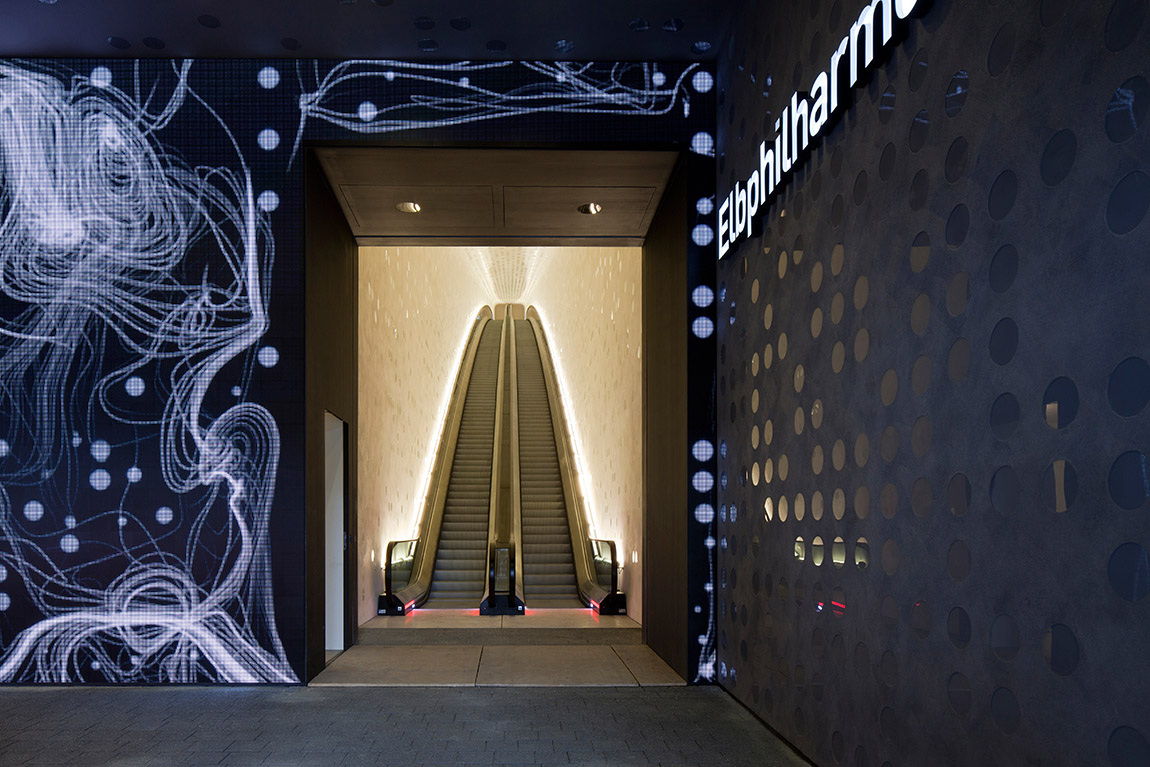
Tube entrance. Photo: © Oliver Heissne
Experience the city from above
The Plaza in the Elbphilharmonie is the central meeting place in the Elbphilharmonie and forms the link between the warehouse and the new structure. The viewing platform here is open to the public. Even getting to it is an experience: an 80-metre-long, slightly curved escalator transports visitors through the building. From the Plaza, at a height of 37 metres above the ground, a stunning panoramic view over the city and port opens up before the viewer. An outside walkway leads around the entire building. Inside, there is the hotel lobby, the Elbphilharmonie shop, a dining area and the stairways to the concert halls. The Elbphilharmonie Plaza extends an equally warm welcome to all residents of Hamburg and to visitors from near and far, whether or not they have come to enjoy a concert.
The heart
The heart of the Elbphilharmonie is the Grand Concert Hall. The 2,100 seats are arranged around a centrally located stage, a staging that is reminiscent of terraced vineyards. No member of the audience is seated more than 30 metres from the conductor. Being so unusually close to the action turns this new acoustic space into a place of unforgettable musical encounters. In order to achieve optimum acoustics, the architects developed a special wall and roof structure together with internationally renowned acoustician Yasuhisa Toyota – the ‘White Skin’. 10,000 individually shaped gypsum fibre panels cut with millimetre precision ensure targeted sound distribution that reaches every corner. For the Grand Hall, the Bonn-based organ building company Klais developed an extraordinary concert hall organ with 4,765 pipes that are located in, next to and behind the audience stands. There is also an additional remote unit with four registers located in the reflector above the stage.
The upper part of the Elbphilharmonie building also houses the Recital Hall. In this intimate and versatile space, elegantly shaped wood panelling – which was also designed by Toyota – ensures perfect acoustics. With seating for 550 people, the Recital Hall is the ideal venue for chamber music, lieder recitals and solo recitals, as well as jazz and world music concerts. The flexible seating means that the space can be used for a wide variety of purposes.
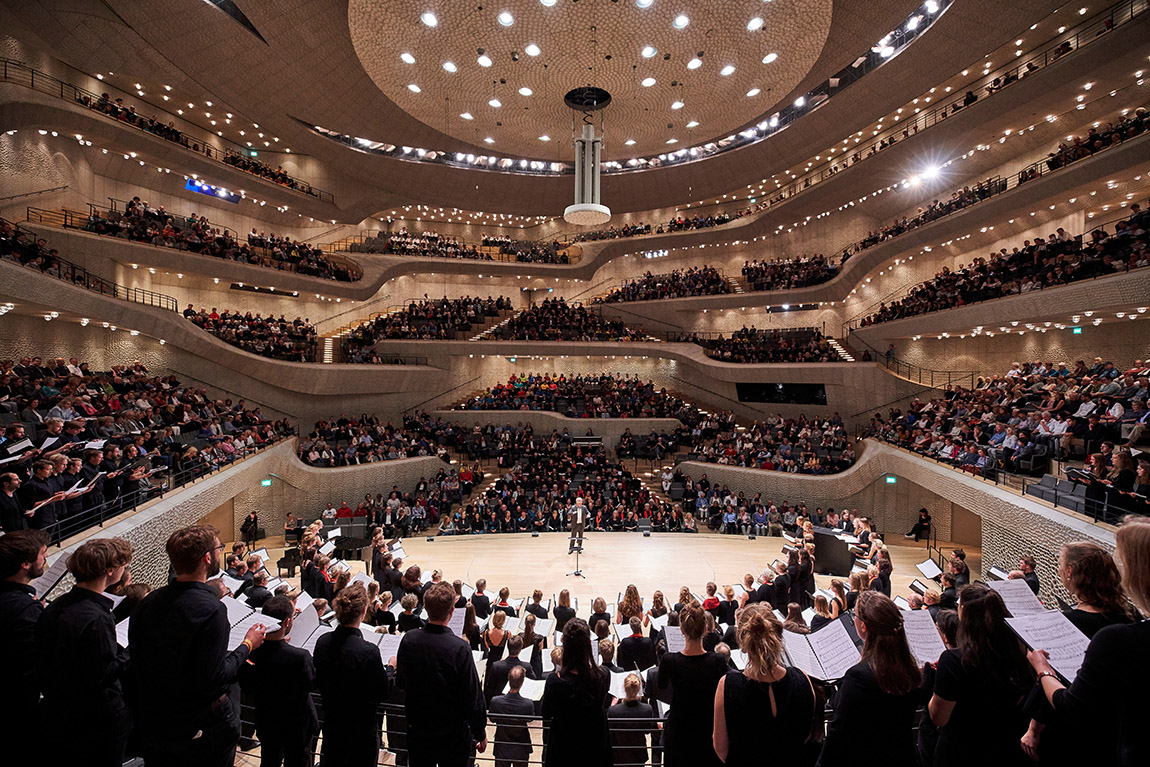
Grand Hall. Photo: © Sophie Wolter
A boundless music experience for everyone
The task of making music accessible, approachable and something that everyone can experience was, as it were, written into the Elbphilharmonie’s DNA. The concerts are therefore bursting with musical colour and contrast, and the programming is devoid of any ‘blinkered’ artistic style. The broad musical spectrum includes orchestral concerts and operatic performances with the best orchestras in the world; piano, string quartet and lieder recitals; as well as world music, electronic and pop music. International stars have an impact on the musical heartbeat of the concert hall, as do the artists and ensembles within the city. The NDR Elbphilharmonie Orchestra has taken its place as the Elbphilharmonie’s orchestra in residence, while the Recital Hall provides the Ensemble Resonanz with a space for its excellent concert programme, which is dedicated to contemporary music in particular.
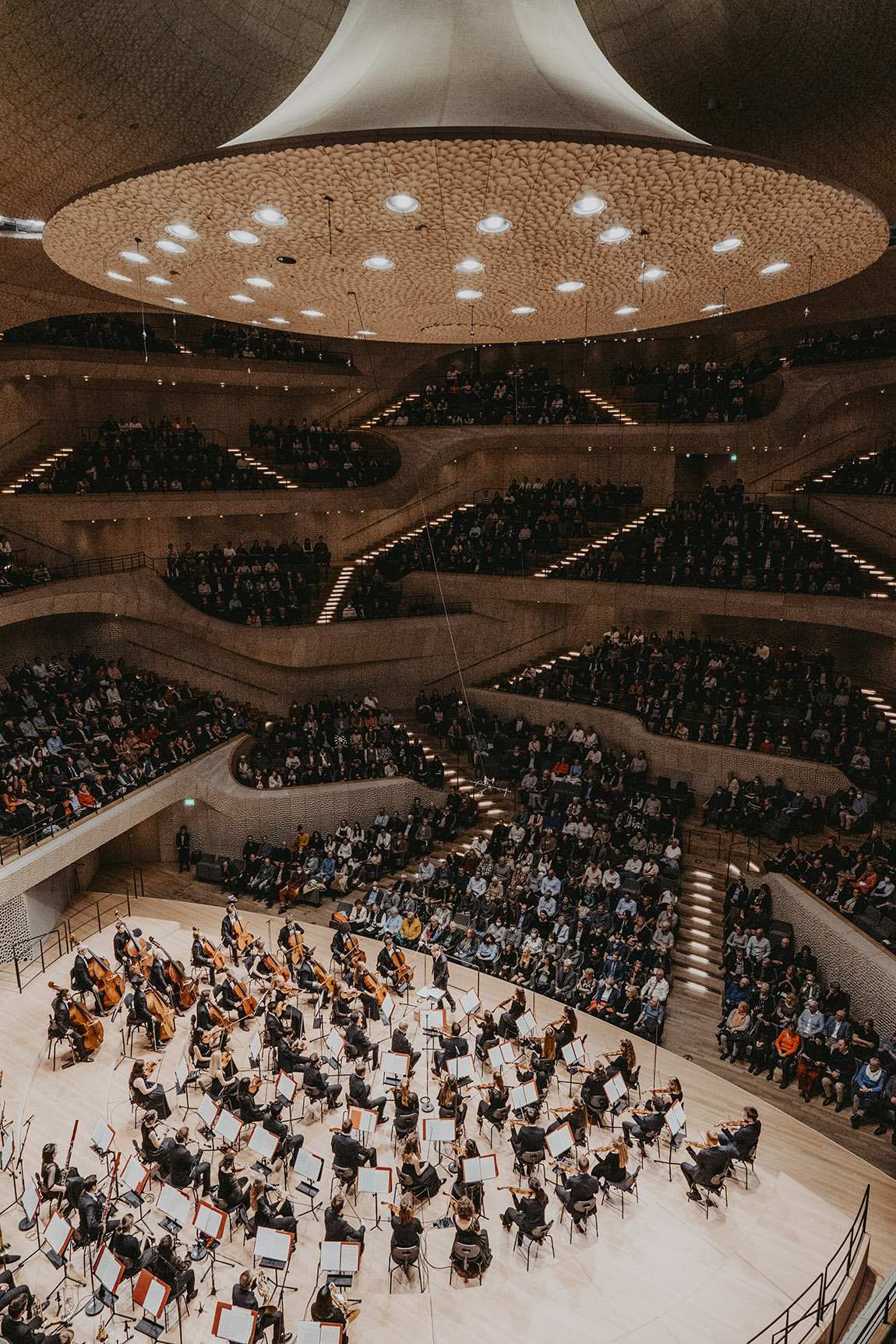
Photo: © Sophie Wolter
As a gateway to the world of music, the Elbphilharmonie Hamburg is therefore more than purely a classical concert hall: its extensive music education programme, featuring concerts for children and families, projects to get involved in, and workshops for all ages, transforms it into a vibrant platform for all kinds of musical encounters.
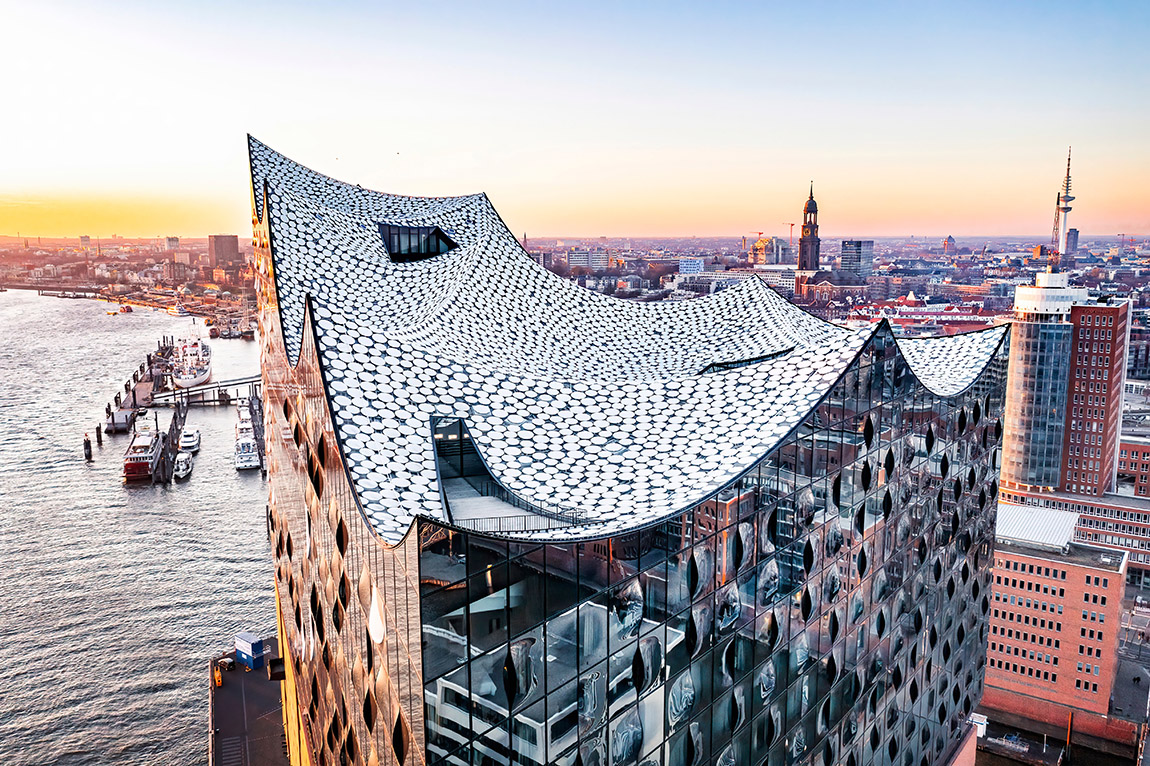
Photo: © Thies Rätzke
Spectacular architecture, musical diversity, openness and accessibility to all – the Elbphilharmonie unites all the multifaceted aspects Hamburg has to offer and helps broaden the view through Hamburg as a gateway to the world, as the city has prided itself on doing for generations.
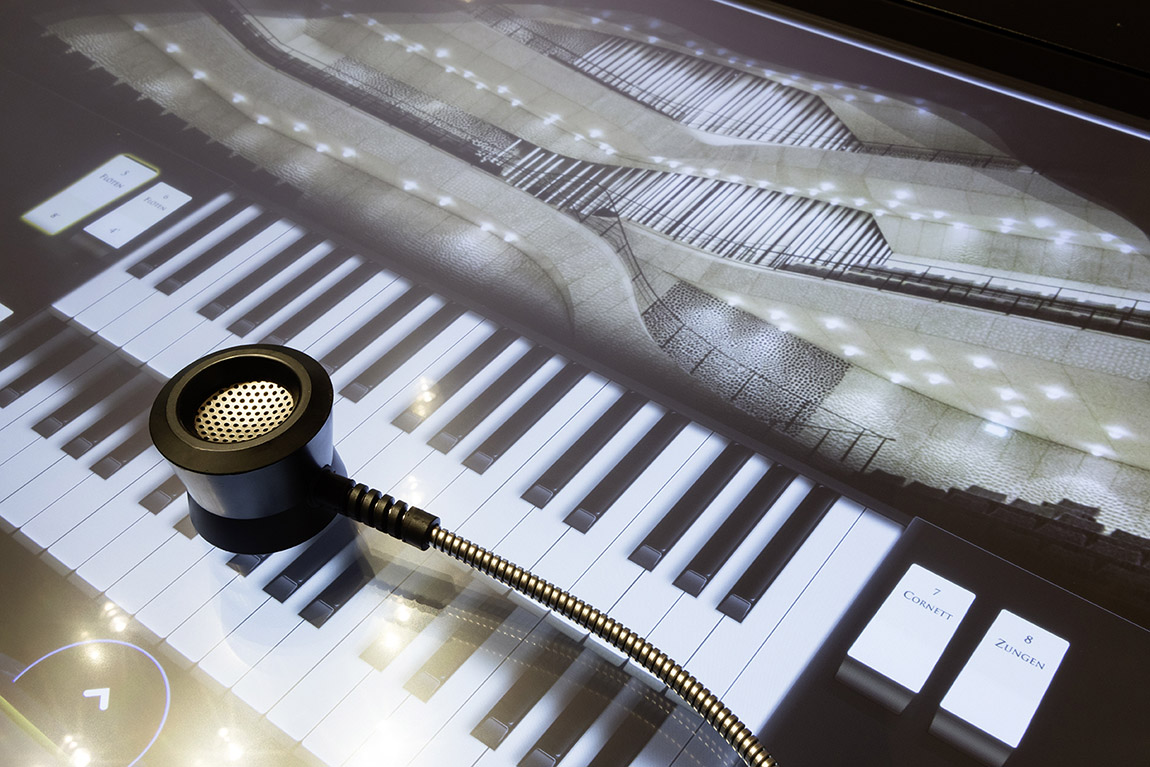
Smart Table. Photo: © Peter Hundert
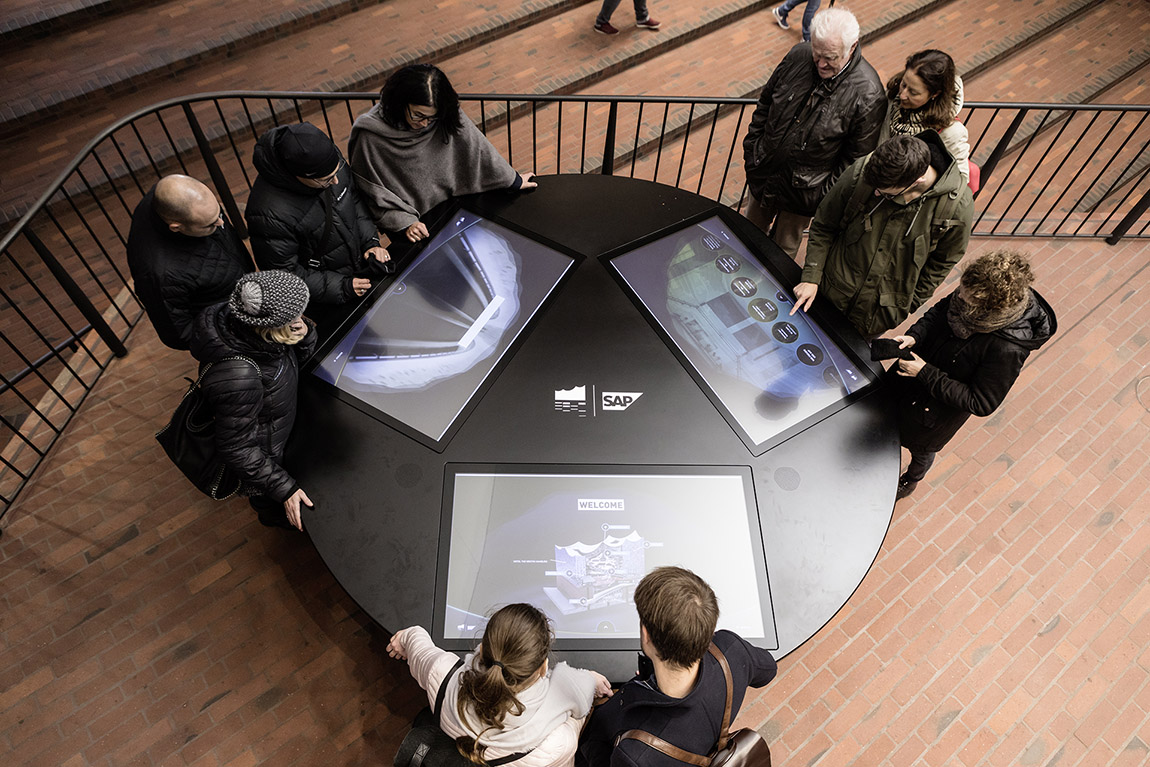
Smart Table. Photo: © Peter Hundert
Getting there:
Underground Rail: Hop on Underground Line U3 or Line U4 and get down at Baumwall or Überseequartier stations respectively. Both stations are within walking distance.
Bus: Take bus line 111 and alight at Am Kaiserkai, which is just 150 metres from the Elbphilharmonie or bus line 6 and disembark at Auf dem Sande, which is approximately 550 metres away from the concert hall.
Car: The Elbphilharmonie Hamburg boasts a multistorey paid car park with 435 parking spaces in total, with parking open 24/7.
Further information and tickets: www.elbphilharmonie.de
Social media: www.facebook.com/elbphilharmonie.hamburg
www.twitter.com/elbphilharmonie
www.facebook.com/elbphilharmonie.hamburg
www.instagram.com/elbphilharmonie
Subscribe to Our Newsletter
Receive our monthly newsletter by email


